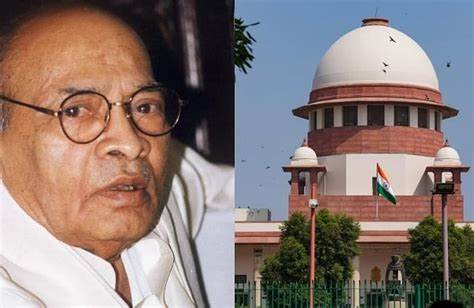By C Subrahmanyam
In a significant move, the Supreme Court has decided to reexamine the 35-year-old JMM MPs bribery case by referring it to a larger bench of seven judges. This case is linked to alleged bribes paid to four JMM MPs to secure their support for the PV Narasimha Rao-led Congress government during a pivotal no-confidence motion in July 1993.
A constitution bench, presided over by Chief Justice of India D Y Chandrachud, declared the 1998 verdict, which acquitted JMM leaders of corruption and conspiracy charges, as “erroneous” and “perverse.” They emphasized that this judgment stemmed from a “misconception of law” and a “misapplication of facts,” violating key constitutional principles of equality, probity, and accountability.
The bench highlighted a “legal anomaly” created by the 1998 verdict, where bribe-givers faced conviction and imprisonment while bribe-takers escaped consequences. This was contrary to the Prevention of Corruption Act, 1988, which deems both parties equally culpable.
Furthermore, the larger seven-judge bench will assess whether the 1998 verdict correctly interpreted Article 105 of the Constitution, which grants MPs immunity for their actions in Parliament, including voting. The court will also examine whether the JMM MPs’ votes amounted to a “sale of conscience” and a “betrayal of trust” of their constituents.
This decision has substantial implications, particularly for Jharkhand Chief Minister Hemant Soren and his family members, who are among the accused. Hemant Soren is the son of JMM leader Shibu Soren, one of the four MPs allegedly involved in accepting bribes from the Congress government. The other accused MPs are Suraj Mandal, Shailendra Mahato, and Simon Marandi.
The CBI, acting as the prosecuting agency, had filed a review petition in 2014, challenging the 1998 verdict and seeking a fresh trial for the JMM leaders. The CBI alleged that these MPs received Rs 37.5 crore as part of a “criminal conspiracy” to prop up the government. They claimed to possess substantial evidence, including audio recordings, bank records, and confessional statements, implicating the JMM MPs.
On the contrary, the JMM leaders contested the review petition, arguing that the 1998 verdict was final and binding and couldn’t be reopened after 16 years. They maintained that their support for the government was based on political ideology, not monetary gain.
The Supreme Court will now convene a larger bench of seven judges to reconsider this case, setting the stage for a critical judgment with far-reaching consequences for Jharkhand’s political landscape and the nation as a whole.



